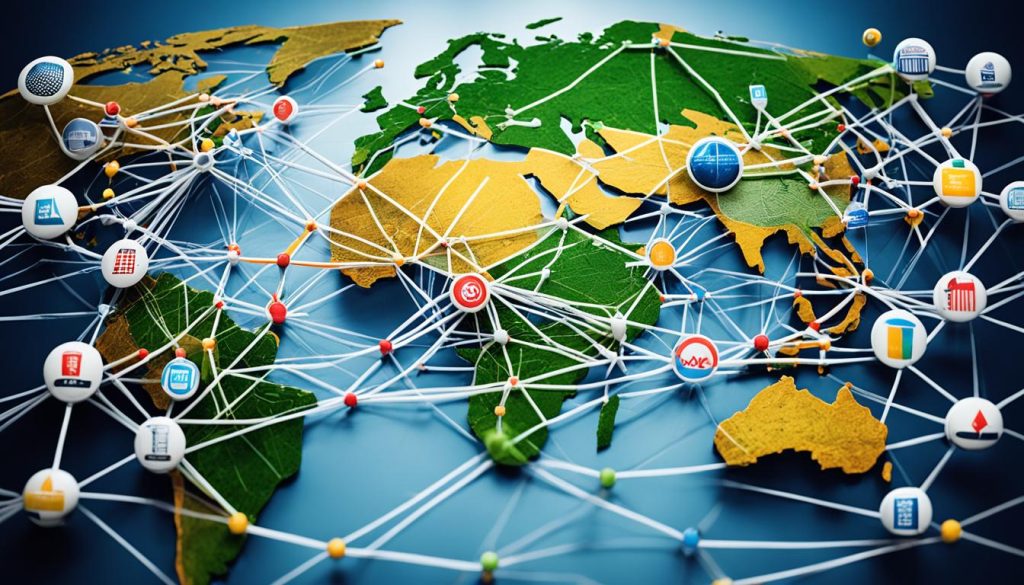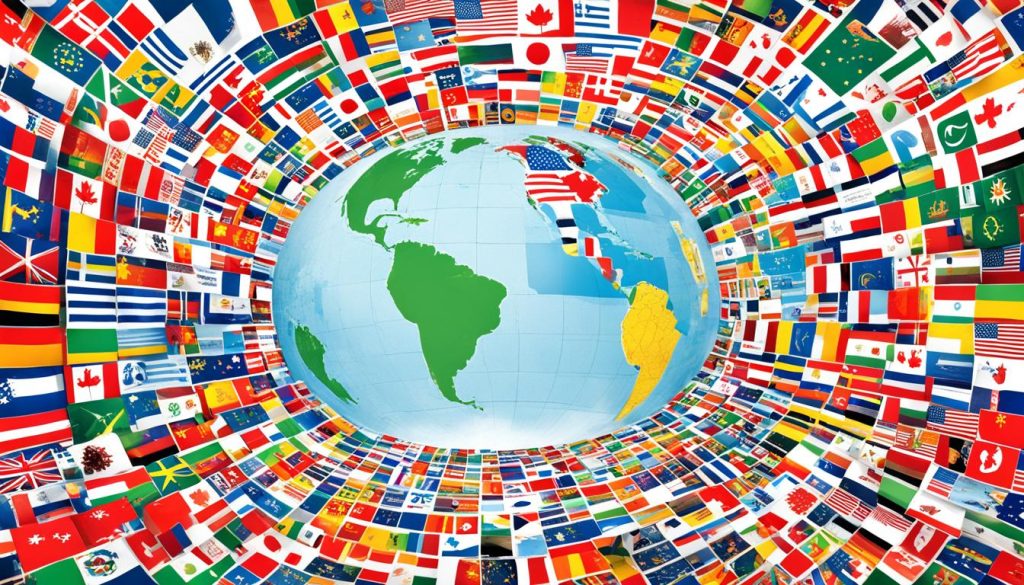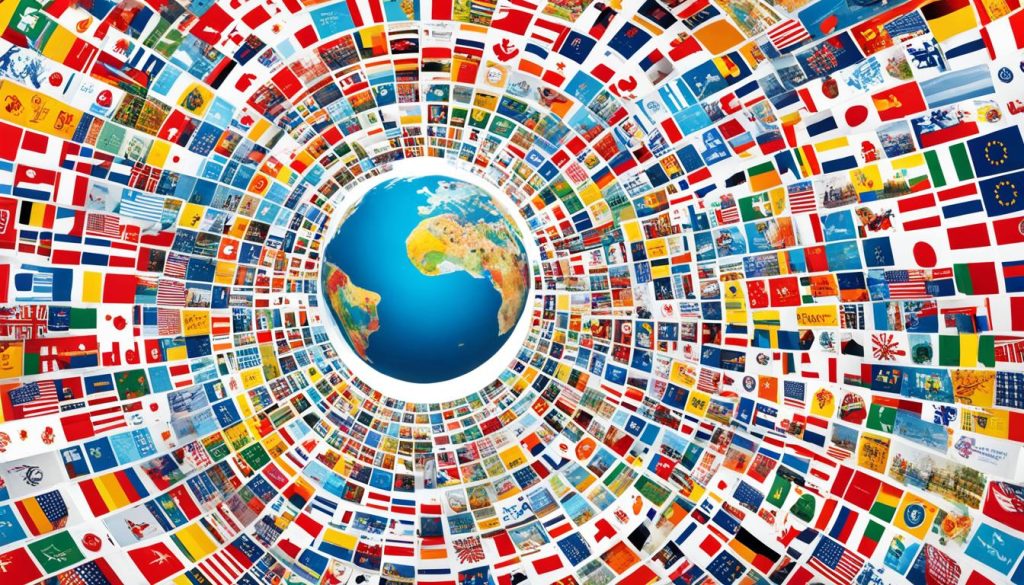Multinational corporations (MNCs) play a big role in our world. These giants work in many countries and touch every sector – economy, culture, and trade. They create jobs, push for new technology, and make both local and global economies grow.
To really get what these corporations do, we need to look at their efforts. They not only improve infrastructure and spark innovation but also tackle environmental and social issues. Their Corporate Social Responsibility (CSR) actions show how they help shape today’s world.
Key Takeaways
- MNCs play a crucial role in job creation and employment trends globally.
- These corporations significantly contribute to local economies through investments and infrastructure development.
- MNCs influence international trade and commerce through partnerships and trade agreements.
- Investment in research and development by MNCs drives technological advancement and innovation.
- They engage in CSR initiatives to address environmental and social challenges.
- MNCs face a range of challenges including regulatory compliance, cultural barriers, and political risks.
The Definition of Multinational Corporations
Multinational corporations (MNCs) are key players in today’s global economy. They operate in several countries and have complex management structures. This setup helps them engage economically worldwide and manage operations across borders.
What Qualifies as a Multinational Corporation?
To be seen as a multinational corporation, a company must operate in countries beyond its own. They have a main office that coordinates global management. MNCs carry out cross-border activities, tapping into global economic chances and managing intricate supply chains. Brands like Apple, Samsung, and Toyota are notable examples, with significant operations worldwide.
Historical Development of Multinational Corporations
The story of multinational companies starts in the 17th century with the East India Companies. They were some of the first to undertake cross-border operations. Since then, globalization and technology have drastically changed the scene. Now, giants like Google and Microsoft don’t just influence markets. They also play a big role in international trade and policies.
This comparison maps out how multinational corporations have evolved:
| Era | Key Characteristics | Notable Companies |
|---|---|---|
| 17th to 19th Century | Colonial trade, monopoly agreements, colonial resources exploitation | East India Company, Dutch East India Company |
| 20th Century | Industrial revolution, post-war economic expansion, global trade agreements | Ford, General Motors, IBM |
| 21st Century | Technology-driven globalisation, digital economy, robust cross-border operations | Apple, Google, Samsung |
This brief history gives insight into the current roles and complexity of MNCs in the global market today.
Economic Contributions of Multinational Corporations
Multinational corporations greatly influence the economies of their host countries. They invest widely and bring many economic benefits. Their impact is both extensive and important.
Job Creation and Employment Trends
Multinationals are key in creating jobs worldwide. They set up in different countries, offering many jobs. For example, companies like Toyota and Unilever employ millions globally. This helps local job growth.
They also boost local businesses by requiring related services. This further improves job trends in those areas.
Boosting Local Economies
Multinationals enhance local economies beyond just providing jobs. They invest in local markets, which boosts economic growth and improves living standards. Nestlé’s investment in Colombian and Brazilian coffee plants is a prime example.
This investment raises the GDP, strengthens industries, and increases economic productivity.
Investment in Infrastructure
The effects of multinational investments are clearly seen in infrastructure. Companies like Siemens and General Electric invest in important local projects. They build things like transport systems and energy plants.
These investments offer crucial services and elevate the quality of life. They also support sustained economic growth, offering great benefits to host nations.
Influence on International Trade and Commerce

Multinational corporations (MNCs) are key in global trade and commerce. They shape economic policies, tariffs, and agreements worldwide. Through their strategies and networks, they affect economies on a large scale.
Trade Agreements and Partnerships
Trade agreements and partnerships help MNCs thrive in the global market. These deals cut tariffs and open new markets. Large companies like Apple, Starbucks, and IBM use them to improve globally.
By adapting to regulations and cooperating internationally, they boost economic growth. This also makes them more competitive worldwide.
Influence on Global Supply Chains
MNCs have a huge impact on global supply chains. They plan and coordinate across countries for smooth production and distribution. For example, Unilever and Toyota show how to reduce risks and costs.
They use advanced technologies and strong networks to improve supply chains. This helps them stay flexible and meet changing demands quickly.
Role in Technological Advancement
Multinational corporations (MNCs) lead in developing new technologies. They invest a lot in research and development. This commitment changes many industries and leads to new inventions.
Investment in Research and Development
Multinationals put a lot of money into research and development (R&D). Companies like Google, Apple, and Samsung spend big parts of their budgets on research. They aim to create new technology. This often leads to new patents that set standards and shape expectations.
In the pharmaceutical world, companies like Pfizer and Johnson & Johnson spend billions on R&D. Their work brings out new treatments and medicines. This shows how R&D spending can help the world’s health.
Innovation and Technological Disruption
Tesla has changed the car industry with its electric vehicles. Multinationals play a big role in such changes. Microsoft’s work in cloud computing has changed how businesses use IT, making solutions more flexible and scalable.
These corporations don’t just create new tech. They start trends that others follow. The iPhone by Apple has hugely influenced mobile technology, pushing others to keep innovating.
Also, multinational corporations work together with universities and research centres. By sharing resources, they speed up tech advances. This teamwork makes sure new inventions meet market needs, helping industries grow and transform.
Environmental Impact of Multinational Corporations
The story of multinational corporations (MNCs) is full of ecological challenges but also chances for bettering the planet. These big companies are working hard to be more eco-friendly. They’re doing this amidst varying rules across the globe.
Sustainability Initiatives
MNCs are mixing sustainability with their main goals. Big names like Unilever and Nestlé are leading the way. They’re cutting down carbon, using more from nature, and betting on clean energy.
This shift has a big impact on ecosystems. It means less reliance on old energy sources and less pollution. Efforts to lessen waste and save water show their dedication to being green.
Challenges in Environmental Management
Still, going green comes with hurdles. Laws differ across borders, making it hard to apply green steps everywhere. Also, it’s tough to manage emissions and waste globally.
- Regulatory compliance issues
- Carbon footprint in supply chains
- Technological and infrastructure limitations
Matching growth with caring for the planet is tricky. As MNCs grow, keeping up green practices gets harder. Thus, getting money and support for eco-tech is vital to beat these challenges.
| Company | Sustainability Initiative | Impact on Ecosystems |
|---|---|---|
| Unilever | Renewable Energy Adoption | Reduction in Carbon Emissions |
| Nestlé | Water Conservation | Improved Water Quality |
| Tesla | Electric Vehicles | Reduced Air Pollution |
In the end, the road to greenness for MNCs is not smooth but filled with promise. Their push towards eco-responsibility and sustainable actions is making a difference. By facing these challenges, they lessen their environmental mark and lead as examples of good global citizens.
Corporate Social Responsibility (CSR) Initiatives
Corporate social responsibility (CSR) is key in today’s business world. MNCs now focus on community, ethics, and global engagement. Their CSR programs make a big difference locally and worldwide.
Community Engagement and Philanthropy
CSR means working closely with local communities for multinationals. They fund education, healthcare, and green projects. Through “Project Shakti,” Unilever has changed lives in rural India, offering women jobs and training.
Ethical Business Practices
Multinationals aim for high ethical standards. They ensure fair work, openness, and follow the law. IKEA, for example, sources wood carefully to protect the planet and maintains its ethical image.
Case Studies of Successful CSR Programs
Many big companies have impactful CSR initiatives. Starbucks’ “Global Farmer Fund” aids coffee growers, ensuring Starbucks gets sustainable coffee. Google’s Green Program aims to cut down on carbon emissions for a greener future.
| Company | CSR Initiative | Impact |
|---|---|---|
| Unilever | Project Shakti | Empowers rural women in India |
| IKEA | Sustainable Wood Sourcing | Minimises environmental impact |
| Starbucks | Global Farmer Fund | Supports sustainable farming |
| Green Program | Reduces carbon footprint |
The Global Workforce of Multinational Corporations

Managing a multinational workforce is complex. It requires understanding different employee needs and labor laws. Fostering inclusive environments for cross-cultural teams is key.
Multinational corporations need strong international HR strategies for cross-cultural teams. This ensures effective communication and collaboration. It’s vital to understand and respect cultural differences that affect teamwork and output.
Experts from companies like Unilever and HSBC share insights on international HR. Strategies should be tailored and focus on:
- Adapting recruitment processes to attract talent from diverse cultural backgrounds.
- Implementing comprehensive training programs that address cultural awareness and sensitivity.
- Creating policies that cater to the well-being of employees in various regions, taking into account local labour laws and practices.
- Utilising technology to bridge communication gaps and enhance virtual team collaborations.
The table below shows strategies for managing multinational workforces and their benefits:
| Strategy | Benefits |
|---|---|
| Adapting Recruitment Processes | Attracts a diverse talent pool, enhancing innovation and creativity. |
| Comprehensive Training Programs | Promotes cultural awareness, reducing potential conflicts and misunderstandings. |
| Employee Well-being Policies | Improves employee satisfaction and retention, fostering loyalty. |
| Technology Utilisation | Enhances communication and coordination, making remote work feasible and efficient. |
As the global workforce grows, multinational corporations must constantly improve their HR strategies. This helps them keep up with changing cross-cultural teams. Their aim is to maintain a united, effective workforce for global success.
Challenges Faced by Multinational Corporations
Multinational corporations face many issues. They deal with different laws and cultural barriers in each country. These challenges can greatly affect their work and success.
Regulatory and Compliance Issues
Understanding and following various country laws is tough for multinational corporations. Each place has its own complex rules. They need strong compliance methods to follow these laws and avoid legal problems.
Cultural and Social Barriers
It’s important to bridge cultural gaps in global businesses. Companies must learn and respect different social norms. Using effective communication and cultural training helps overcome these obstacles.
Political Instability and Risks
Political issues are big challenges for multinational companies, especially in unstable areas. Upheavals, policy changes, and unrest can harm business operations. They make planning tough and can risk company assets.
What Do Multinational Corporations Do?
Multinational corporations (MNCs) serve many roles in the world’s economy. They operate in many places, making their goods and services available in various countries. MNCs have grown beyond big manufacturing companies. They now cover the tech, healthcare, finance, and retail sectors too.
These companies focus on being efficient and coming up with new ideas. They use their worldwide reach to make things run smoother, cut costs, and enter new markets. They invest a lot in research and development. This keeps them ahead in the competition.
The following table illustrates the breadth of MNC activities across various between specific areas of business:
| Industry | Activities |
|---|---|
| Manufacturing | Production, supply chain management, and global distribution networks |
| Technology | Research and development, innovation, and software services |
| Healthcare | Pharmaceutical production, global clinical trials, and health services |
| Finance | Banking services, investment management, and insurance |
| Retail | Global supply chains, market development, and customer service |
MNCs have different departments handling various tasks, which helps them operate smoothly across the globe. This setup helps them deal with tough regulations, cultural differences, and shaky economies. To sum up, the way MNCs are organised plays a big role in their global success.
The Role of Multinational Corporations in Globalisation
Multinational corporations play a key role in driving globalisation. They are major actors in spreading corporate influence across borders. They also boost global economic integration. Their wide reach helps in moving capital, goods, and people freely. This movement speeds up the connection between global markets.
These corporations are at the forefront of globalisation. They use their vast resources to enter new markets. Such expansion boosts economic development in these areas. This creates a more linked global economy. By setting up in different countries, they help improve access to various markets and resources.
Their strategic actions show that globalisation is a real and active process. They push for advancements in research, technology, and innovation. This greatly helps in linking economies closer together. It shows how integrated our global economy has become.
The role of these corporations includes:
- They help integrate the global economy by making international trade smoother.
- They boost cross-border impact by having a network of operations worldwide.
- They drive globalisation by moving into new markets and spreading their investments.
We can better understand their role through this comparison:
| Aspect | Impact on Globalisation | Role of Multinational Corporations |
|---|---|---|
| Capital Flow | Drives investment and growth in different areas. | Moves huge financial resources across countries. |
| Trade of Goods | Makes a wide range of products available worldwide. | Runs large supply chains and distribution networks. |
| People Movement | Encourages cultural exchanges and movement of skilled workers. | Shares expertise and talent around the world. |
Impact on Consumer Markets Worldwide
Multinational corporations greatly shape how we buy, what we choose, and even our tastes worldwide. They use clever marketing and widespread branding to reach different people. These companies are skilled at changing their products for different places without losing their unique brand image.
Shifts in Consumer Preferences
The global market is always changing, meaning what people want can change too. Companies like Unilever have to quickly adapt to these shifts. They’ve turned to making sustainable products, answering a worldwide call for more eco-friendly choices. This move not only meets new demands but also fosters strong customer loyalty.
Brand Recognition and Loyalty
Being recognizable and building loyalty are key for large brands. Coca-Cola and Nike are everywhere, known for their constant quality and clear messages. They lead in how to engage with customers and keep them coming back. Successfully mixing local touches with a global brand is why they remain leaders.
Multinational Corporations and Emerging Markets
Multinational corporations, or MNCs, are key players in emerging markets. They open up paths for growth and development. Their strategies for setting up in these countries are clever and always changing.
They find new markets to dive into. This helps them succeed in business and boosts the economy.
Expansion Strategies
MNCs use a mix of local partnerships, direct investments, and product adjustments to fit local needs. Companies like Procter & Gamble form joint ventures with local firms to integrate into markets effectively.
They also need to understand local laws and cultural differences. This knowledge is key for a smooth start and long-lasting presence.
Success Stories in Emerging Markets
Coca-Cola’s achievements in Africa show how well businesses can do in developing countries. They invested in local facilities and networks to grab a big market share. Unilever’s Operation Shakti in India has also made a big impact.
It has helped rural entrepreneurs grow, opening up new markets for the company.
Potential Risks and Rewards
Entering emerging markets is both risky and rewarding. Companies might face political issues, changing laws, and economic ups and downs. Yet, they can reach huge new customer bases, find untapped resources, and see high returns.
By smartly managing these risks and grabbing growth chances, MNCs can build a strong footprint in these economies.
| Company | Market | Strategy | Outcome |
|---|---|---|---|
| Coca-Cola | Africa | Local production and distribution | Significant market share |
| Unilever | India | Operation Shakti programme | High market penetration |
| Procter & Gamble | Various emerging markets | Joint ventures | Sustainable operations |
Strategic Alliances and Partnerships

Strategic alliances and partnerships are key for big companies working across countries. They help meet company goals, reach more customers, and create new things by bringing different skills and resources together.
Joint Ventures and Collaborations
Creating joint ventures and collaborations is vital in global business. These joint venture strategies let companies enter new areas, combine resources, and spread risks. For instance, BP and Reliance Industries work together in India’s energy market. They use their combined strengths to benefit from growing energy needs in India.
Benefits of Strategic Alliances
The advantages of strategic alliances are many. Collaborative business advantages boost innovation, save costs, and enhance market position. By sharing technology advances and market insights, these partnerships can really help in creating better products and reaching more customers.
| Benefits | Description |
|---|---|
| Innovation | Pooling of resources and expertise accelerates technological advancements. |
| Market Reach | Access to new geographical markets, customer bases, and distribution networks. |
| Risk Sharing | Shared investment and operational costs lower the risks associated with market entry. |
| Cost Efficiencies | Streamlined operations and shared infrastructure reduce overall expenditure. |
The Future Landscape for Multinational Corporations
The world of multinational corporations is about to change a lot. Global economies are evolving fast. It’s vital to look at the trends and innovations that will change how they work. Also, it’s important to know the challenges that may come to stay ahead.
Predicted Trends and Innovations
Artificial intelligence and machine learning are big future trends for corporations. These technologies will make supply chains better, improve how customers are treated, and help in making better decisions. With a focus on digital growth, corporations will spend more on the latest technologies and data analytics. This is to keep winning in a very competitive market.
Potential Challenges Ahead
But, there are challenges that could make things tough for multinational corporations. Changes in global politics, economic troubles, and new rules could mess with plans and strategies. Also, there’s a big focus on being more sustainable and reducing harm to the environment. This means corporations need to follow stricter practices. They have to deal with the tough rules worldwide and what people think about their environmental efforts.
In conclusion, a mix of tech advances and new global trends will shape the future for multinational corporations. By being quick to adapt, corporations can use these changes to bring new ideas and face challenges. This will help them grow sustainably in a world that keeps changing.
















